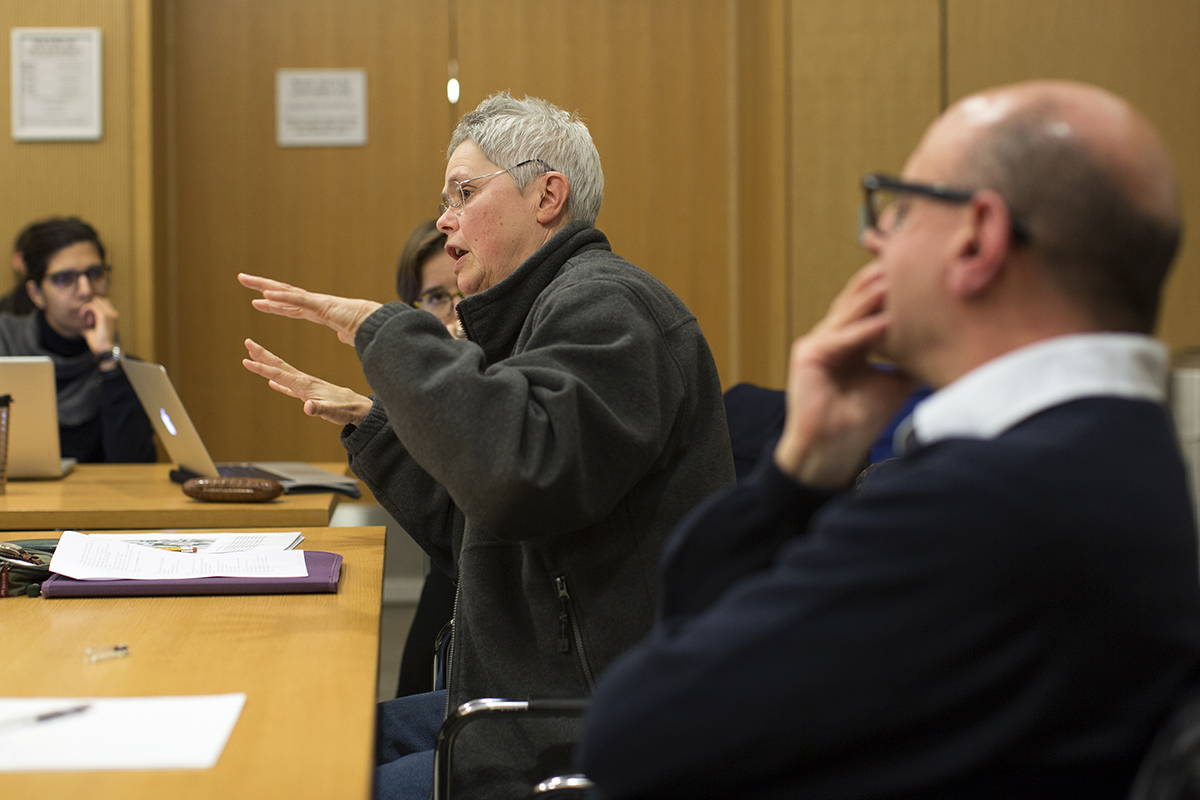Theory Reading Group examines Trump and fascism
By Linda B. Glaser

Fascism has been used to describe the rise of right-wing parties in the U.S. and Europe, but is Donald Trump a fascist, as some have claimed? On Dec. 5, the Theory Reading Group examined this question in a room crowded with students and faculty in the Physical Sciences Building, with formal remarks by professors Enzo Traverso and Isabel Hull.
Despite Trump playing the charismatic leader who alone is able to save the country with his exceptional, almost demiurgic faculties, and despite his speeches and meetings having “an incontestably fascist taste,” Traverso said the fascist elements remain superficial and involve only Trump’s personality. “Fascism is reducible neither to the temperament of a political leader nor to the psychological predispositions of his followers. The fact is that Trump does not lead a mass movement; he is a TV star,” said Traverso, the Susan and Barton Winokur Professor in the Humanities in the Department of Romance Studies.
Hull pointed out that some of the things that paved the way for fascism in Germany are repeated now, such as a weak government that was intentionally undermined by its elites, and “a highly stove-piped national press, such that people only heard and saw what they already thought, and that should sound familiar though it now comes in a different mode,” said Hull, the John Stambaugh Professor of History in the College of Arts and Sciences.
Another similarity Hull pointed to was that Hitler, like Trump, “had no regard for bureaucracy or law or regularity or policies. Under National Socialism, that system of government made it flexible, adaptable, but also self-radicalizing and ultimately completely self-destructive.”
Classical fascism worshipped the state, defended imperialism and promoted military expansionism, said Traverso. Trump is oriented toward isolationism. “In the field of foreign policy, his vision does not transcend his own business interests. Instead of fascism, which strongly affirmed the idea of national or racial community, Trump preaches individualism. All in all, he embodies a xenophobic and reactionary vision of Americanism: a social-Darwinist self-made man, the avenger bringing arms, the resentment of a white population that cannot accept becoming a minority in a country of immigrants,” said Traverso.
In explaining Trump’s ascendance there’s been far too much emphasis placed on socio-economic problems and far too little on cultural and status problems, said Hull: Populism, not fascism, better explains Trump’s support. U.S. populism, she said, began as a revolt by farmers against the industrial and financial movements of the 1880-90s. It was a status revolt “by a group of people who felt sold out because they received lip service as being great yeoman farmers … but who believed that they were being disadvantaged and sold out by the rest of America.” It was, said Hull, a liberation movement to “free them from their perceived victimized status and return to values they felt that they epitomized.” And while this populist movement was xenophobic and racist, it lacked effective leadership, strong organization or the transcendent ideology that defines fascism and National Socialism.
Trump won, said Traverso, because of “the rejection of the political establishment through both mass abstention and a protest vote captured by a populist demagogue” – not because of a fascist revolution.
Linda B. Glaser is a staff writer for the College of Arts and Sciences.
Media Contact
Get Cornell news delivered right to your inbox.
Subscribe